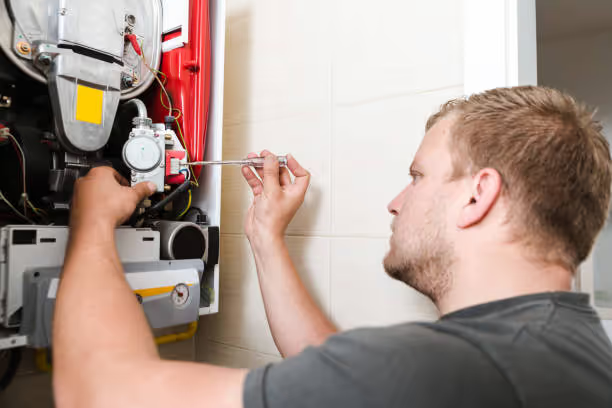Heating Maintenance in Smithtown, NY
Keeping your heating system properly maintained is essential for reliable, safe, and cost-effective comfort during Smithtown winters. Scheduled heating maintenance in Smithtown, NY focuses on seasonal inspections, filter and component servicing, efficiency tuning, and safety testing so your furnace, boiler, or heat pump performs at peak capacity when temperatures drop. Regular maintenance reduces breakdown risk, lowers operating costs, and preserves equipment life—especially important in coastal Long Island homes where humidity and salt air accelerate wear.

Common heating systems and issues in Smithtown homes
Smithtown homes commonly use gas furnaces, oil furnaces, boilers, and increasingly, heat pumps. Each system has typical maintenance needs and common problems influenced by local conditions like cold winter snaps, high humidity, and occasional coastal corrosion.
- Gas furnaces: dirty burners, clogged filters, weak ignition or flame sensing, cracked heat exchanger, poor airflow.
- Oil furnaces: clogged nozzles, fuel filter issues, soot buildup affecting combustion efficiency.
- Boilers: low pressure, failing circulator pumps, scale or sediment in hydronic systems, leaking valves.
- Heat pumps: low refrigerant charge, reduced capacity in defrost cycles, reversing valve wear, outdoor coil corrosion from salt air.
- Ductwork and ventilation: leaks, gaps, dust and allergen buildup, and unbalanced airflow leading to cold or hot spots.
What a scheduled heating maintenance visit includes
A professional seasonal inspection for heating maintenance in Smithtown, NY typically follows a thorough checklist designed to catch problems early, optimize efficiency, and validate safety controls. Typical tasks include:
- Visual inspection of the entire heating system and surrounding area
- Replace or inspect air filters; recommend the correct MERV rating for your home
- Test ignition and combustion components (burners, pilot, electronic ignition)
- Inspect heat exchanger or boiler flue for cracks, corrosion, or soot
- Measure gas pressure and fuel delivery (where applicable)
- Test safety controls, limit switches, and emergency shutoffs
- Check blower motor, belts, bearings, and fan operation; clean as needed
- Inspect and lubricate moving parts and electrical connections
- Verify thermostat calibration and operation; review schedule settings
- Measure airflow and static pressure when possible; inspect duct connections
- Test for carbon monoxide and check venting integrity and draft
- For heat pumps: check refrigerant levels, reversing valve, outdoor coil, and defrost operation
- For boilers: check pressure, expansion tank condition, relief valve, and circulator function
- Clean condensate traps and drain lines; check condensate pump if installed
- Provide a written service summary with findings, efficiency notes, and recommended repairs or parts
Most maintenance visits take 45–90 minutes depending on system type and condition. The written report helps homeowners understand priorities for repairs and the expected impact on efficiency and safety.
Efficiency tuning and common repair solutions
Maintenance is more than inspection; it often includes small adjustments that restore efficiency and prevent breakdowns:
- Filter replacement and duct sealing to restore designed airflow and improve heat transfer
- Burner cleaning and combustion tuning to restore proper fuel/air ratio and improve efficiency
- Calibration of thermostat and zone controls to eliminate short cycling and uneven heating
- Lubrication and balancing of blower assemblies to reduce noise and increase lifespan
- Tightening or replacing electrical connections that cause intermittent failures
- Replacing worn belts, motor bearings, or failing capacitors that reduce reliability
- Recharging refrigerant and repairing leaks in heat pumps for consistent heating capacity
- Flue and vent repairs to maintain safe exhaust and prevent backdrafting
Timely repairs during seasonal maintenance are usually less expensive and less disruptive than emergency callouts in January. For many systems, simple maintenance can improve operational efficiency by up to 10–15% and extend equipment life by several years.
Safety testing and regulatory concerns
Safety is a core element of heating maintenance. Technicians perform carbon monoxide testing, combustion efficiency checks, and venting inspections to identify hazardous conditions such as cracked heat exchangers or blocked flues. In Smithtown, where older homes and mixed fuel systems are common, safety testing helps protect occupants and ensures compliance with local codes and insurance requirements.
Maintenance-plan and membership options tailored for Smithtown
Many homeowners in Smithtown opt for maintenance-plan memberships to keep their heating systems on a predictable service schedule. Common features of these plans include:
- Annual or semiannual scheduled tune-ups timed before the heating season
- Priority service or quicker dispatch during peak winter demand
- Regular filter replacement programs and reminder scheduling
- Discounted diagnostic fees and parts pricing for members
- Seasonal system health reports and service history tracking
- Recommended frequency adjustments for heat pumps (often biannual) versus furnaces/boilers (usually annual)
- Documentation that can help preserve manufacturer warranties
Maintenance plans provide budget predictability and peace of mind, especially for properties exposed to coastal humidity and winter storms that increase strain on systems.
Practical homeowner tips between professional visits
Simple actions between service visits can keep your system running smoothly all season:
- Change or clean filters every 1–3 months depending on household conditions
- Keep at least 1–2 feet of clearance around outdoor heat pump units and outdoor vents; clear leaves and debris in fall
- Check for unusual noises, odors, or visible leaks and document the date and conditions
- Install and test carbon monoxide alarms near sleeping areas and check batteries regularly
- Use programmable or smart thermostat schedules to reduce runtime without sacrificing comfort
- Insulate exposed pipes and maintain proper attic and crawlspace insulation to reduce heating load
Why timely heating maintenance matters in Smithtown
Smithtown residents face a mix of cold winter temperatures, humid conditions, and coastal environmental factors that can accelerate wear. Regular heating maintenance protects your home by improving safety, lowering monthly operating costs, preventing emergency breakdowns during the coldest periods, and maximizing equipment life. For multi-system homes or older properties, scheduled maintenance also helps prioritize repairs so investments are made where they deliver the most reliability and efficiency.
Regular heating maintenance in Smithtown, NY is an investment in comfort, safety, and long-term cost control. A well-documented maintenance history and proactive servicing keep systems running efficiently and give homeowners confidence through every winter season.
Customer Testimonials
Hear directly from homeowners who trust Bobby O’s HVAC Inc. for fast response times, honest service, and lasting comfort.











